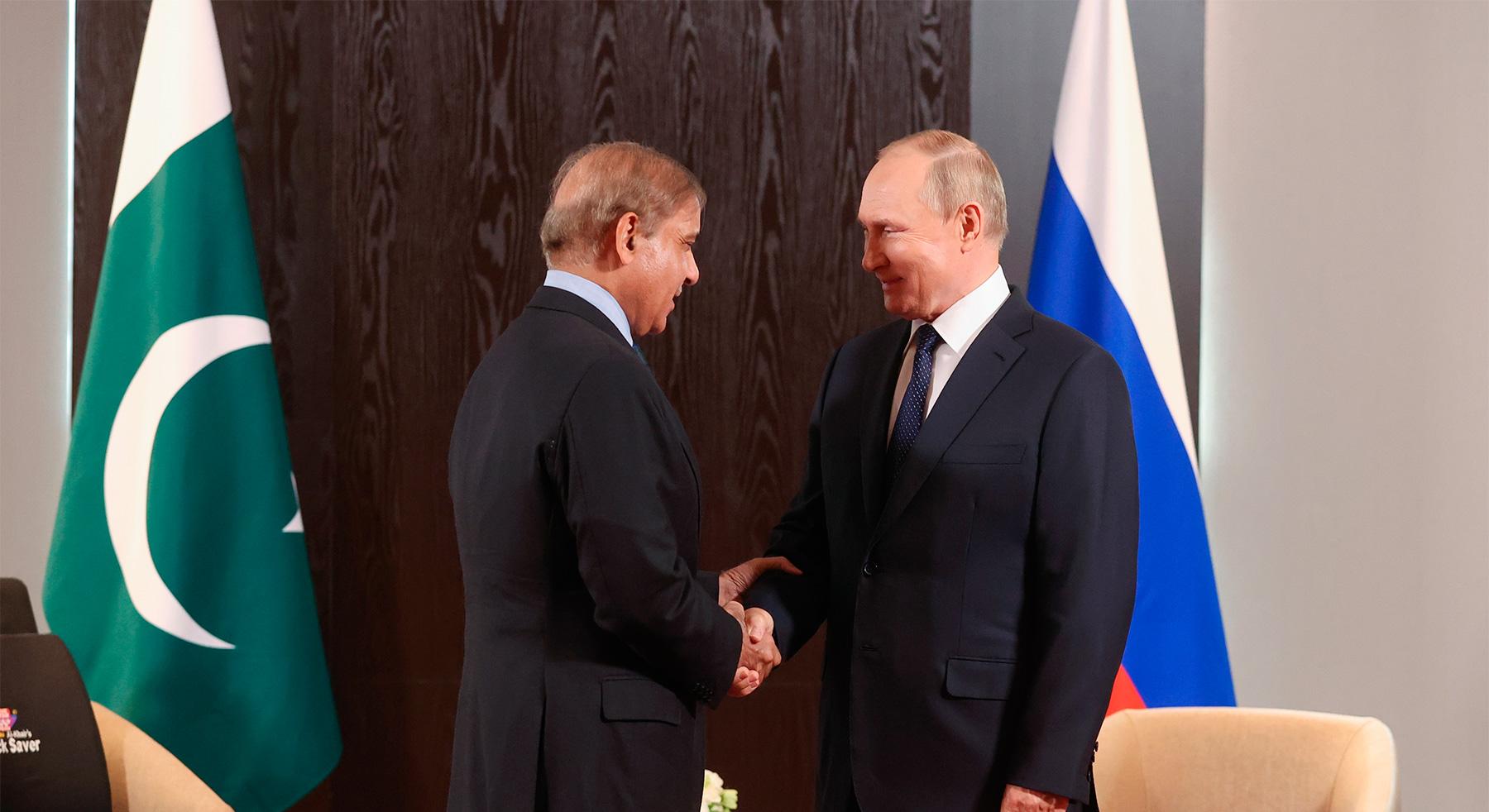In the ever-evolving landscape of global geopolitics, Russia and Pakistan are poised to enter a new phase of cooperation, driven by shared interests and mutual respect. Historically marked by a complex interplay of alliances and rivalries, the two countries have now found common ground, particularly in the aftermath of the U.S. withdrawal from Afghanistan, the Ukraine crisis and shifting power dynamics in regions like the South China Sea and the Middle East.
The convergence of Russian and Pakistani interests is rooted in their shared desire for regional stability, economic growth and enhanced security. The existing cooperation between Russia and Pakistan spans several critical areas, including defense, energy and the economy.
Regional platforms such as the Shanghai Cooperation Organization (SCO), the Belt and Road Initiative (BRI) and BRICS have become crucial for enhancing Russia–Pakistan relations. As members of the SCO, Russia and Pakistan have actively engaged in efforts to combat terrorism, promote regional security and foster economic cooperation.
The BRI, spearheaded by China, is another critical link connecting Russia and Pakistan. Russia's potential involvement in the initiative can extend its benefits to a broader regional context, linking Eurasia through infrastructure, trade and energy projects that span from Moscow to Islamabad.
Moreover, the BRICS grouping, which brings together Brazil, Russia, India, China, South Africa, Ethiopia, Iran, Egypt and the United Arab Emirates, offers another avenue for Russia–Pakistan cooperation.
China's influence in Russia–Pakistan relations cannot be understated. As a rising global power, China's strategic alignment with both Moscow and Islamabad provides a stabilizing factor in their bilateral relations. The India–Pakistan rivalry, however, adds a layer of complexity to Russia's diplomatic balancing act. At the same time, both Russia and Pakistan are keen to ensure that their growing ties do not come at the expense of regional stability.
The potential for cooperation between Russia and Pakistan is vast, encompassing a wide range of sectors, including diplomatic and political cooperation, the economy and trade, science and technology, defense, energy and education.
Pakistan has demonstrated its commitment to strengthening relations with Russia through various diplomatic and strategic initiatives. The future of Russia–Pakistan relations is sure to be bright, marked by a convergence of interests, strategic cooperation and a shared vision for regional stability. With careful diplomacy and proactive engagement, both nations can unlock the full potential of their partnership, paving the way for a new era of bilateral relations.
In the ever-evolving landscape of global geopolitics, Russia and Pakistan are poised to enter a new phase of cooperation, driven by shared interests and mutual respect. Historically marked by a complex interplay of alliances and rivalries, the two countries have now found common ground, particularly in the aftermath of the U.S. withdrawal from Afghanistan, the Ukraine crisis and shifting power dynamics in regions like the South China Sea and the Middle East. This convergence of interests, coupled with the influence of their common ally, China, presents a unique opportunity for both nations to forge a robust partnership across multiple domains.
Convergence of interests and existing cooperation
The convergence of Russian and Pakistani interests is rooted in their shared desire for regional stability, economic growth and enhanced security. Both countries have been vocal in advocating a peaceful resolution to the conflict in Afghanistan, recognizing that instability in the region could have far-reaching consequences. Pakistan, with its strategic location, has emerged as a key player in the post-Afghanistan withdrawal scenario, while Russia, with its historical ties and strategic interests in Central Asia, seeks to maintain its influence in the region.
The existing cooperation between Russia and Pakistan spans several critical areas, including defense, energy and the economy. The two nations have conducted joint military exercises such as the Druzhba (Friendship) drills, which have strengthened their defense collaboration. Russia has also expressed interest in investing in Pakistan's energy sector, particularly in the construction of the North–South gas pipeline, which would provide a significant boost to Pakistan's energy infrastructure.
Impact of regional platforms: SCO, BRI, BRICS and beyond
Regional platforms such as the Shanghai Cooperation Organization (SCO), the Belt and Road Initiative (BRI) and BRICS have become crucial for enhancing Russia–Pakistan relations. As members of the SCO, Russia and Pakistan have actively engaged in efforts to combat terrorism, promote regional security and foster economic cooperation. The SCO provides a multilateral framework that enables both countries to collaborate with other regional powers, further cementing their strategic partnership.
The BRI, spearheaded by China, is another critical link connecting Russia and Pakistan. The China–Pakistan Economic Corridor (CPEC), a key component of the BRI, has already deepened economic ties between Pakistan and China. Russia's potential involvement in the BRI can extend these benefits to a broader regional context, linking Eurasia through infrastructure, trade and energy projects that span from Moscow to Islamabad.
Moreover, the BRICS grouping, which brings together Brazil, Russia, India, China, South Africa, Ethiopia, Iran, Egypt and the United Arab Emirates, offers another avenue for Russia–Pakistan cooperation. While India is a member of BRICS, Russia and Pakistan can still find common ground within this framework to address global economic challenges, call for a more equitable world order and collaborate on issues like sustainable development and climate change.
These regional alliances not only provide a platform for cooperation but also reinforce the importance of a multipolar world where regional powers like Russia and Pakistan can collaborate on an equal footing. They create opportunities for both nations to diversify their diplomatic and economic partnerships, reducing dependency on any single global power and ensuring a balanced approach to international relations.
Changing geopolitics and the role of China
The changing geopolitical landscape, especially after the U.S. troop withdrawal from Afghanistan, has created a vacuum that both Russia and Pakistan are keen to address. In this context, China plays a pivotal role as a common friend to both nations. China’s BRI has already fostered closer economic ties between Pakistan and China, and Russia's involvement in the initiative offers further opportunities for trilateral cooperation. The China–Pakistan Economic Corridor (CPEC), a flagship project of the BRI, could potentially extend to Russia, linking the three nations through a network of infrastructure and trade routes that would enhance connectivity and economic integration.
China's influence in Russia–Pakistan relations cannot be understated. As a rising global power, China's strategic alignment with both Moscow and Islamabad provides a stabilizing factor in their bilateral relations. The shared vision of a multipolar world, where regional powers like Russia and China can counterbalance Western dominance, further strengthens the trilateral relationship.
Impact of India–Pakistan rivalry
The longstanding rivalry between India and Pakistan is a critical factor in shaping Russia–Pakistan relations. Historically, Russia has maintained close ties with India, particularly in the defense sector. However, as global dynamics shift, Russia has shown a willingness to diversify its relations in South Asia. While maintaining its strategic partnership with India, Russia recognizes the importance of engaging with Pakistan as a key regional player.
The India–Pakistan rivalry adds a layer of complexity to Russia's diplomatic balancing act. At the same time, both Russia and Pakistan are keen to ensure that their growing ties do not come at the expense of regional stability. By focusing on areas of mutual interest such as counterterrorism, economic development and regional security, Russia and Pakistan can navigate the challenges posed by their respective relations with India.
Potential of bilateral cooperation
The potential for cooperation between Russia and Pakistan is vast, encompassing a wide range of sectors:
Diplomatic and Political Cooperation: Both nations can work together on regional and international platforms, advocating multilateralism, conflict resolution and respect for international law. Their shared stance on such key issues as the importance of the United Nations and the need for a multipolar world can strengthen their political alliance.
Economic and Trade Relations: With the establishment of innovative transaction settlement mechanisms, as discussed by Pakistan's high-level committee on Russia, both countries can significantly boost bilateral trade. Exploring opportunities in agriculture, industry and infrastructure development will further solidify economic ties.
Science and Technology (S&T): Collaboration in science and technology, particularly in space exploration, cybersecurity and artificial intelligence, can propel both nations to new heights of innovation and competitiveness.
Education and Cultural Exchange: Expanding educational exchanges and cultural ties can foster mutual understanding and strengthen people-to-people connections, laying the foundation for a long-lasting partnership.
Defense Cooperation: Building on existing military collaboration, Russia and Pakistan can explore joint defense production, training programs and intelligence sharing to enhance their security capabilities.
Energy and Industrial Cooperation: Russia's expertise in energy, combined with Pakistan's growing demand, creates opportunities for cooperation in oil and gas exploration, renewable energy projects and industrial development.
Pakistan’s efforts to strengthen relations
Pakistan has demonstrated its commitment to strengthening relations with Russia through various diplomatic and strategic initiatives. The establishment of a high-level committee on Russia, headed by Minister for Planning, Development, and Special Initiatives Ahsan Iqbal, is a testament to Pakistan's proactive approach. This committee is working on developing a comprehensive roadmap for engagement with Russia, including innovative ways to facilitate trade and business transactions despite international sanctions.
Additionally, Pakistan's efforts to expand rail connectivity through the Pakistan–Iran–Turkey route and explore multi-gauge options highlight its ambition to enhance regional connectivity, with potential benefits for Russia–Pakistan trade.
The future of Russia-Pakistan relations
As global power dynamics continue to shift, Russia and Pakistan have a unique opportunity to redefine their relations. The Ukraine crisis, the Israeli–Palestinian conflict and tensions in the South China Sea have underscored the need for new alliances and partnerships that prioritize regional stability and economic growth. With China as a common ally, Russia and Pakistan can work together to navigate these challenges and seize opportunities for cooperation.
The true potential of Russia–Pakistan relations lies in their ability to adapt to changing geopolitical realities while maintaining a focus on shared interests. By deepening their cooperation across diplomatic, political, economic and security dimensions, Russia and Pakistan can emerge as strong partners in a multipolar world, contributing to regional and global stability.
The future of Russia–Pakistan relations is sure to be bright, marked by a convergence of interests, strategic cooperation and a shared vision for regional stability. With careful diplomacy and proactive engagement, both nations can unlock the full potential of their partnership, paving the way for a new era of bilateral relations.







